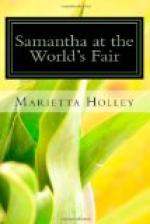“Why,” sez he, “there is one hundred kinds of grain in that one model farm of Illinois.
“Now, if that picter should git torn to pieces by a cyclone, what would a ile paintin’ be? A dead loss.
“But that grain farm-house, what food for hens that would make—such a variety. Why, the hens would jest pour out eggs fed on the ruins of that farm.
“Give me beauty and economy hitched together in one team.”
[Illustration: “What food for hens that would make.”]
I sithed, and the sithe wuz deep, almost like a groan, and sez I—
“You tire me, Josiah Allen—you tire me almost to death.”
“Wall,” sez he, “I’m talkin’ good horse sense.”
Sez I, “I should think it wuz animal sense of some kind—nothin’ spiritual about it and riz up.”
“Wall,” sez he, “you’ll see five hundred folks a-standin’ round and praisin’ up them seed picters where there is one that gits carried away as you do over Wattses ‘Love and Death’ and Elihu Vedder’s dum picters.”
“Wall,” sez I, in a tired-out axent, “that don’t prove anything, Josiah Allen. The multitude chose Barrabus to the Divine One.
“Not,” sez I reasonably, “that I would want to compare the seed picters and the butter females to a robber.
“They’re extremely curious and interestin’ to look at, and wonderful in their way as anything in the hull Exposition.
“But,” sez I, “there is a height and a depth in the soul that them butter figgers can’t touch—no, nor the pop-corn trees can’t reach that height with their sorghum branches. It lays fur beyond the switchin’ timothy tail of that seed horse or the wavin’ raisen mane of that prune charger. It is a realm,” sez I, “that I fear you will never stand in, Josiah Allen.”
“No, indeed,” sez he; “and I don’t want to. I hain’t no desires that way.”
Again I sithed, and we walked off into another gallery.
Wall, I might write and keep a-writin’ from Fourth of July to Christmas Eve, and then git up Christmas mornin’ and say truly that the half hadn’t been told of what we see there, and so what is the use of tryin’ to relate it in this epistle.
But suffice it to say that we stayed there all day long, and that night we meandered home perfectly wore out, and perfectly riz up in our two minds, or at least I wuz. Josiah’s feelin’s seemed to be clear fag, jest plain wore out fag.
The nights are always cool in Chicago—that is, if the weather is anyways comfortable durin’ the day.
And this night it wuz so cool that a good woollen blanket and bedspread wuz none too much for comfort.
And it wuz with a sithe of contentment that I lay down on my peaceful goose-feather pillow, and drawed the blankets up over my weary frame and sunk to sleep.
I had been to sleep I know not how long when a angry, excited voice wakened me. It said, “Lay down, can’t you!”




